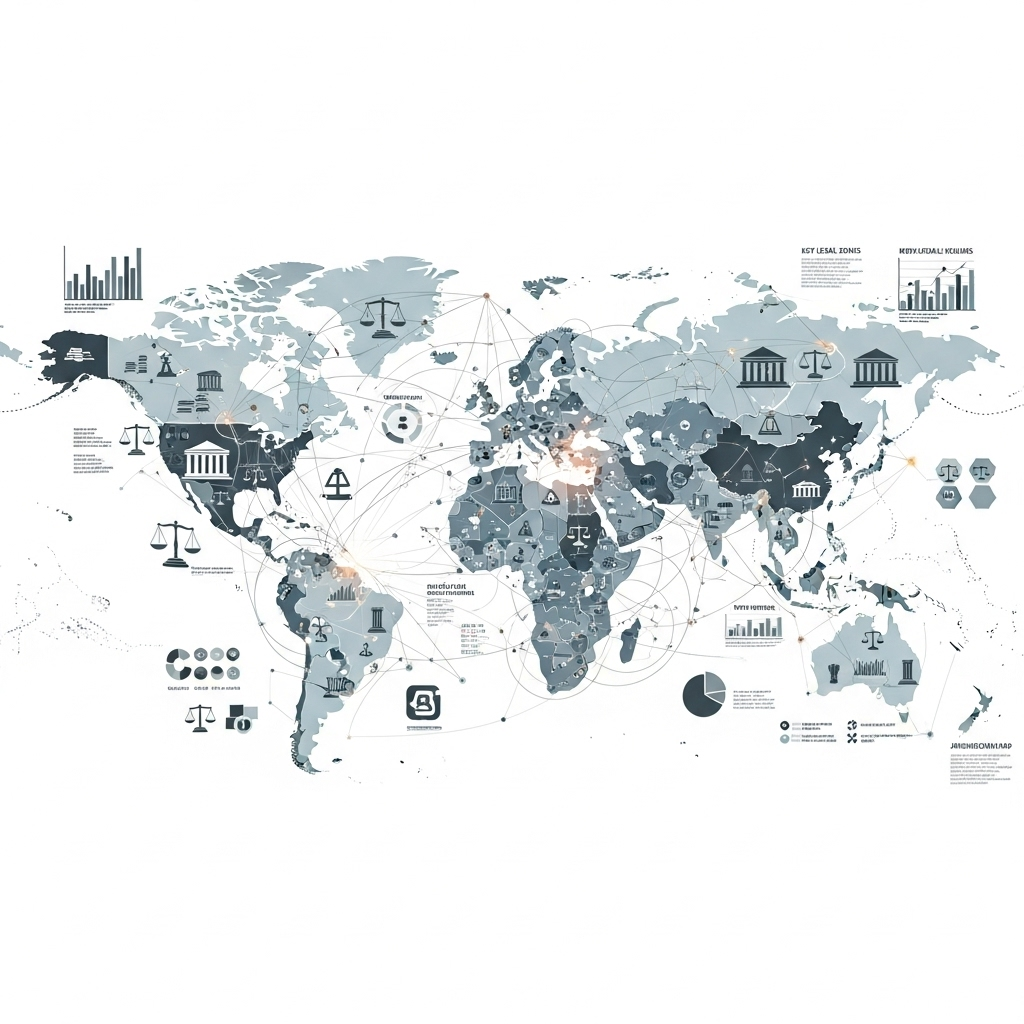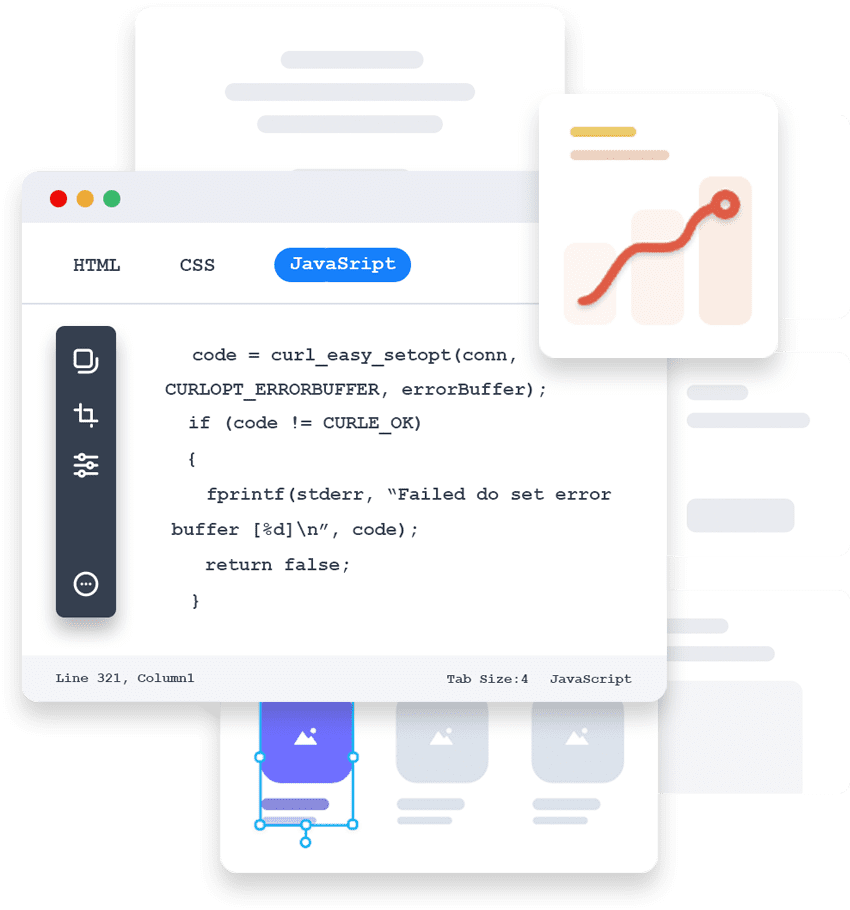
Multi-Language & Jurisdictional Intelligence
Break down language barriers and navigate complex international legal frameworks with AI that understands both linguistic nuances and local legal requirements across 25+ languages and 100+ jurisdictions.
Global Business Requires Global Legal Intelligence

In today's interconnected global economy, business transactions routinely cross linguistic and jurisdictional boundaries. What was once the exclusive domain of multinational corporations has become standard practice for businesses of all sizes, from tech startups serving international customers to local manufacturers sourcing from global suppliers. This globalization of business has created unprecedented challenges for legal professionals who must navigate an increasingly complex web of languages, legal systems, and regulatory requirements.
Traditional approaches to international contract analysis often involve expensive and time-consuming translation services, followed by jurisdiction-specific legal review that may miss critical nuances lost in translation. This fragmented approach creates delays, increases costs, and introduces risks when subtle but important legal concepts are misunderstood or overlooked due to language barriers or unfamiliarity with local legal practices.
Multi-language and jurisdictional intelligence represents a revolutionary approach to global contract analysis that combines advanced natural language processing with deep legal knowledge spanning multiple jurisdictions. This technology enables organizations to analyze contracts in their original languages while applying jurisdiction-specific legal intelligence, ensuring accurate understanding of both linguistic nuances and local legal requirements.
Advanced Multi-Language Processing

The challenge of multi-language contract analysis extends far beyond simple translation. Legal language contains specialized terminology, cultural concepts, and structural patterns that vary dramatically across different languages and legal traditions. Effective multi-language contract intelligence requires sophisticated understanding of these linguistic and cultural nuances, combined with the ability to preserve legal meaning across language barriers.
Native Language Analysis
Rather than relying on translation as a first step, advanced systems analyze contracts in their original languages using language-specific AI models trained on legal corpora from each jurisdiction. This approach preserves the original legal meaning and context that might be lost or distorted through translation, ensuring more accurate analysis and risk assessment.
Native language analysis is particularly crucial for languages with legal traditions that don't translate directly to English or other major languages. Concepts like "bona fide" in Latin legal systems, "force majeure" in French contract law, or "good faith" obligations in German contracts carry specific legal meanings that extend beyond their literal translations. AI systems trained on native legal texts understand these concepts in their proper cultural and legal contexts.
Cultural and Legal Context Preservation
Legal systems reflect the cultures and historical traditions of their societies, leading to significant variations in contract structure, risk allocation, and relationship management approaches. Common law systems emphasize detailed specification of rights and obligations, while civil law traditions may rely more heavily on general principles and good faith obligations. Understanding these differences is crucial for accurate contract analysis.
Advanced multi-language systems maintain awareness of these cultural and legal contexts, adjusting their analysis methodologies to align with the underlying legal traditions. This contextual understanding ensures that risk assessments and recommendations reflect appropriate standards for each legal system rather than imposing universal criteria that may not be relevant or accurate.
Cross-Language Pattern Recognition
Sophisticated systems can identify similar legal concepts and clauses across different languages, enabling comparative analysis and benchmarking that spans linguistic boundaries. This capability is invaluable for multinational organizations that need to maintain consistency in their contracting approaches while adapting to local legal requirements and business practices.
Comprehensive Jurisdictional Knowledge

Legal systems around the world have evolved distinct approaches to contract law, dispute resolution, regulatory compliance, and business relationships. These differences aren't merely technical variations but reflect fundamental philosophical and practical differences in how legal systems balance competing interests, allocate risks, and enforce agreements. Jurisdictional intelligence provides the deep knowledge necessary to navigate these complex variations effectively.
Legal System Awareness
The distinction between common law and civil law systems represents just the beginning of jurisdictional complexity. Within these broad categories, individual countries have developed unique legal doctrines, statutory requirements, and judicial interpretations that significantly affect contract analysis and enforcement. What constitutes adequate notice in New York might be insufficient under German law, while limitation of liability clauses that are standard in England might be unenforceable in France.
Advanced jurisdictional intelligence systems maintain comprehensive databases of legal requirements, enforcement mechanisms, and interpretive principles for each jurisdiction they cover. This knowledge enables accurate assessment of contract terms not just as written, but as they would likely be interpreted and enforced by local courts and regulatory authorities.
Regulatory Compliance Integration
Modern business operations must comply with an ever-expanding web of regulatory requirements that vary significantly across jurisdictions. Data protection regulations like GDPR in Europe, consumer protection laws in various states and countries, anti-corruption requirements, and industry-specific regulations all affect contract terms and enforcement. Jurisdictional intelligence systems integrate these regulatory requirements into their analysis frameworks.
This integration enables proactive compliance assessment that identifies potential regulatory issues before contracts are executed. Rather than discovering compliance problems during audits or enforcement actions, organizations can address regulatory requirements during the contracting process, reducing risk and avoiding costly remediation efforts.
Dispute Resolution and Enforcement Patterns
Understanding how contracts are likely to be interpreted and enforced in different jurisdictions is crucial for accurate risk assessment and strategic planning. Some jurisdictions favor literal contract interpretation, while others emphasize good faith and commercial reasonableness. Some courts readily enforce penalty clauses, while others routinely reduce them to compensatory levels. Jurisdictional intelligence incorporates these enforcement patterns into contract analysis, providing more realistic assessments of how agreements might perform in practice.
Real-World Applications and Benefits

The practical applications of multi-language and jurisdictional intelligence extend across every aspect of international business operations. From initial contract negotiation through performance monitoring and dispute resolution, this technology provides critical insights that enable more effective global business relationships.
International Supply Chain Management
Global supply chains involve complex networks of suppliers, manufacturers, distributors, and service providers operating under different legal systems and business cultures. Multi-language and jurisdictional intelligence enables comprehensive analysis of supplier agreements, manufacturing contracts, and distribution arrangements, ensuring that terms are appropriate for each jurisdiction and compatible across the entire supply chain.
This capability is particularly valuable for identifying potential conflicts or gaps between different agreements in the supply chain. For example, force majeure provisions that are standard in one jurisdiction might not provide adequate protection in another, creating vulnerabilities that could affect the entire supply network. Jurisdictional intelligence helps identify and address these inconsistencies before they become operational problems.
Cross-Border Mergers and Acquisitions
International M&A transactions involve due diligence analysis of contracts governed by multiple legal systems and drafted in various languages. Traditional approaches require extensive translation and local legal review that can be both expensive and time-consuming. Multi-language and jurisdictional intelligence accelerates this process while improving accuracy and completeness.
The technology enables rapid identification of contracts that may require special attention due to unusual terms, regulatory compliance issues, or enforcement challenges in specific jurisdictions. This targeted approach allows deal teams to focus their limited time and resources on the most critical issues while ensuring comprehensive coverage of the target's contract portfolio.
Technology and Software Licensing
Software and technology companies operating globally must navigate complex licensing requirements, data protection regulations, and intellectual property laws that vary significantly across jurisdictions. Multi-language and jurisdictional intelligence helps these organizations develop licensing strategies that comply with local requirements while maintaining global consistency and efficiency.
This capability is particularly important for cloud-based services that may process data from multiple jurisdictions simultaneously. Understanding how different privacy laws interact and ensuring adequate protection across all relevant jurisdictions requires sophisticated legal intelligence that traditional approaches cannot provide efficiently.
Financial Services and Banking
Financial institutions operating internationally must comply with banking regulations, anti-money laundering requirements, and consumer protection laws that vary dramatically across jurisdictions. Multi-language and jurisdictional intelligence enables these organizations to analyze complex financial agreements while ensuring compliance with applicable regulations and maintaining appropriate risk management practices across all operating jurisdictions.
Integration with Global Operations

The true value of multi-language and jurisdictional intelligence emerges when it's integrated into broader global business operations rather than used as a standalone analysis tool. This integration enables organizations to develop consistent global contracting strategies while maintaining appropriate local adaptation and compliance.
Template Localization and Standardization
Organizations with global operations need contract templates that maintain consistency in business terms while adapting to local legal requirements and business practices. Multi-language and jurisdictional intelligence enables development of template libraries that achieve this balance, providing locally appropriate terms while preserving global business strategies and risk management approaches.
This localization process goes beyond simple translation to include adaptation of legal concepts, risk allocation mechanisms, and dispute resolution procedures that align with local legal systems and business cultures. The result is templates that are both legally effective and culturally appropriate for each jurisdiction while maintaining global consistency in core business terms.
Global Compliance Monitoring
As regulatory requirements continue to evolve globally, organizations need systems that can monitor changes across all relevant jurisdictions and assess their impact on existing contracts and business operations. Multi-language and jurisdictional intelligence provides this ongoing monitoring capability, alerting organizations to regulatory changes that might affect their contracts or business practices.
This proactive monitoring enables organizations to address compliance issues before they become enforcement problems, maintaining good relationships with regulatory authorities and avoiding costly penalties or business disruptions. The alternative – reactive compliance after enforcement actions – is typically much more expensive and disruptive to business operations.
Training and Knowledge Transfer
Multi-language and jurisdictional intelligence systems serve as powerful training tools that help legal and business professionals develop deeper understanding of international contracting practices and requirements. This knowledge transfer capability is particularly valuable for organizations expanding into new markets or developing internal expertise in international business operations.
Future Trends and Developments
Artificial Intelligence Enhancement
Continued advances in artificial intelligence and machine learning promise even more sophisticated multi-language and jurisdictional intelligence capabilities. Future systems will likely provide more nuanced understanding of cultural and legal contexts, better prediction of regulatory changes, and more effective integration with broader business intelligence and decision-making systems.
These technological advances will likely make international contracting more accessible to smaller organizations that previously couldn't afford the expertise necessary for effective global operations. Democratization of international legal intelligence could significantly accelerate global business development and economic integration.
Regulatory Technology Integration
The integration of multi-language and jurisdictional intelligence with regulatory technology (RegTech) solutions promises comprehensive platforms that address all aspects of international compliance and risk management. These integrated systems will likely provide real-time compliance monitoring, automated regulatory reporting, and proactive risk management capabilities that span multiple jurisdictions and business functions.
As global business continues to expand and regulatory requirements become more complex, multi-language and jurisdictional intelligence will become increasingly essential for effective international operations. Organizations that invest in these capabilities today will be better positioned to capitalize on global opportunities while managing the risks inherent in international business operations.
